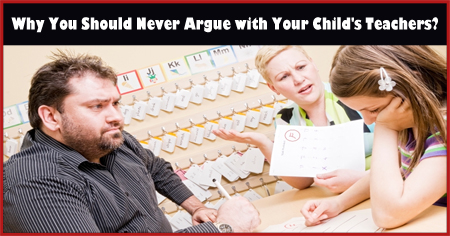 Have you ever argued with your child’s teachers? Like parents, teachers also play a very important role in the growth and development of a child. Here are six reasons why you should never argue with your child’s teachers.
Have you ever argued with your child’s teachers? Like parents, teachers also play a very important role in the growth and development of a child. Here are six reasons why you should never argue with your child’s teachers.Teachers play an important role in shaping child’s future. They are to be respected and valued. A sincere teacher is like a second mother. They know your son and daughter inside out. Teachers have a lot of experience dealing with kids. They understand students and children very well.
Arguing with teachers can create a bad impression of your child. The
teacher may get angry and lose interest in your child.
Arguing in front of other students can make your child uncomfortable.
1. School is Like a Second Home
School is where children spend maximum amount of time after home. It is like a second house. Sitting at home, parents do not know what happens at
school. Your child's teacher can provide a clearer picture of his or her
behaviour at school. Teachers impart good values and mould your child into a confident and good human.
2. Teachers Observe Everything
Teachers are experienced in many ways. They understand
student psychology. They know what is best for your child. They also know her inside out. They can provide great inputs and feedback regarding your child. Your child may be different in school as compared to house.
3. Feedback of Teachers can Help
Trust your child’s teacher and have faith in her. After all, they too are your child’s well-wishers. Have faith and confidence in the teacher’s words. Believe in whatever he or she says. Do not take the feedback or criticism negatively. Listen to her and then carefully place your opinions. Do not fight or irritate the teacher.
4. Teachers Help to Correct Child’s Mistakes
Teach your child also to respect and trust the teacher. Tell her that if teacher points out her mistakes, then it is for his own good. Never ask your child to trouble or go against the teacher. Encourage your child to follow school rules. Ensure that you correct the mistakes which the teacher points out. Help your child plan something special on Teacher’s Day.
5. Teacher's Views and Opinions Matter
One should always respect the views and opinions of the teacher. They too have a fair opinion of your child. They will not be partial or say something wrong. They will only tell for the benefit of your son or daughter. They know what is good and what is not good for the students.
6. They are Your Child's Guardians
Teachers are sort of guardians who want only the best for the students. They care about every student. They have every right to voice their opinion if your son or daughter does something wrong. Children also respect teachers and listen to them. Hence try to put your child in a school where there are only few students in one classroom so that teachers can pay more attention.
7. Do Not Feel Upset
A teacher will never criticize or say something bad. She will only speak the truth. There are many things about your daughter or son which you may not know. A teacher's opinion is highly valuable and important. Do not feel upset if she says something. Instead take it in the proper spirit and have a positive attitude.
Analyze carefully whatever the teacher says about your child. Suppose you feel that the teacher is wrong then carefully voice your suggestions or concerns but do not pick up a quarrel or fight. Arguing with teachers in front of your child can make her have a bad impression about the staff and you surely do not want that to happen. Both parents and students must respect, value and thank the teachers.
However, you must also listen to the other side of story as well. If your child is trying to tell you something about her teacher, do not ignore her. Listen to her carefully. If you find that something wrong is happening to your child, talk to the school authorities patiently and find out the truth.
What roles do teachers play in the growth and development of children? How can parents and teachers work together for development of children? Why should parents never argue with teachers? Discuss here.











 Have you ever argued with your child’s teachers? Like parents, teachers also play a very important role in the growth and development of a child. Here are six reasons why you should never argue with your child’s teachers.Teachers play an important role in shaping child’s future. They are to be respected and valued. A sincere teacher is like a second mother. They know your son and daughter inside out. Teachers have a lot of experience dealing with kids. They understand students and children very well.Arguing with teachers can create a bad impression of your child. The
Have you ever argued with your child’s teachers? Like parents, teachers also play a very important role in the growth and development of a child. Here are six reasons why you should never argue with your child’s teachers.Teachers play an important role in shaping child’s future. They are to be respected and valued. A sincere teacher is like a second mother. They know your son and daughter inside out. Teachers have a lot of experience dealing with kids. They understand students and children very well.Arguing with teachers can create a bad impression of your child. The 

















